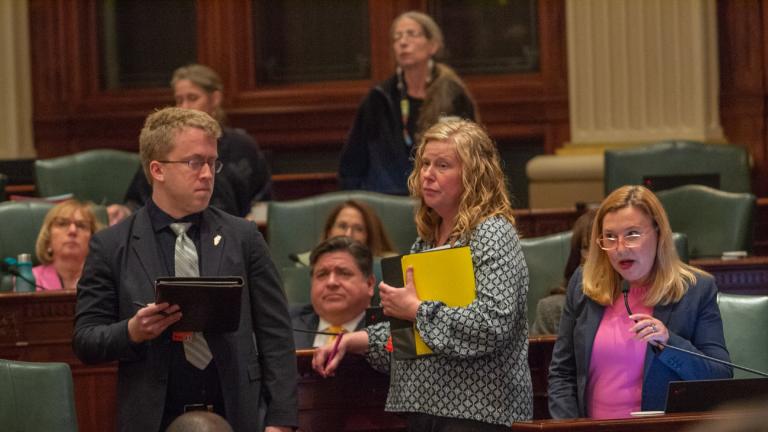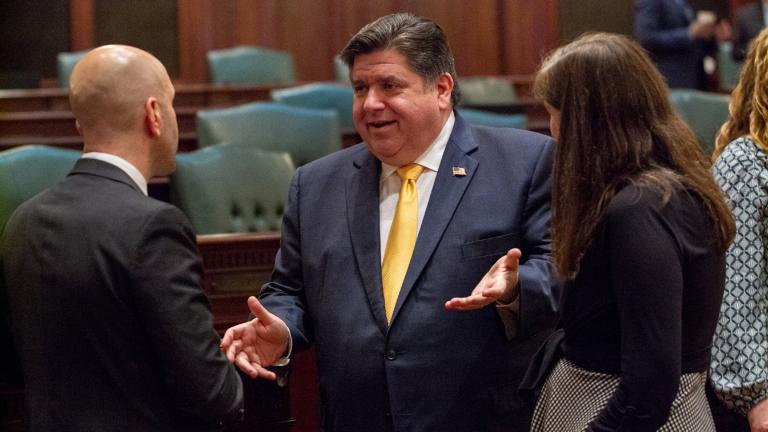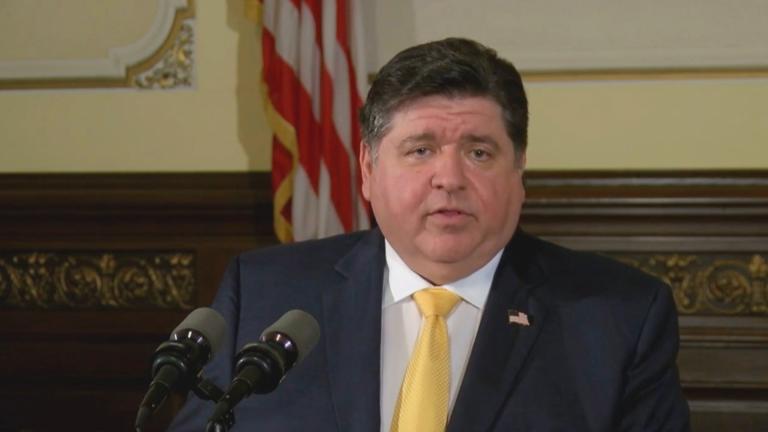It was a sunny, summer morning — perfect for the post-COVID-19 return of Highland Park’s Fourth of July parade.
Until 10:14 a.m.
“Literally out of the clear blue sky, I heard what sounded like what I would describe as many firecrackers going off,” Lauren Bennett told Illinois legislators months later at hearing on what would later become the Protect Illinois Communities Act.
It wasn’t firecrackers. It was hailing bullets. Bennett testified how it felt as she was shot in her hip and upper back, how she feared not only for her life but also for her young sons’ lives.
“Imagine a hot, metal dart-like projectile tearing through your body at supersonic speed, faster than the speed of sound,” Bennett said. “You’ll feel it burn through your skin, only to feel that excessive amounts of blood draining out of you and soaking everything. At this point, you most likely feel as if you are dying.”
Sales of the Smith & Wesson M&P 15 used in the Independence Day attack, which left seven dead, are now banned in Illinois, as are nearly 200 other guns classified as “assault weapons” under the new law.
“Illinois now officially prohibits the sale and distribution of these mass-killing machines,” Gov. J.B. Pritzker said as he signed the law in Springfield on Jan. 10, surrounded by survivors of shootings, family members of shooting victims and other gun control advocates.
With his signature, hundreds — potentially thousands when all permutations, makes, models, colors, features and implements are factored in — of guns became illegal for sale in Illinois.
Those who currently own firearms covered by the law can keep them, but they must register them with the state before January 2024.
Dan Eldridge, who owns Maxon Shooters Supplies and Indoor Range in Des Plaines, said the night of Jan. 10, store employees pulled 15-20% of his inventory off the shelves.
He is complying with the law, even though he opposes it, and in his role as president of the Federal Firearms Licensees of Illinois is suing in federal court to strike down the law.
While Illinois law now specifically categorizes certain guns as “assault weapons,” Eldridge said “the term itself — ‘assault weapon’ — is a made-up term by the gun control people in the late ‘80s when they were trying to conflate semi-automatic rifles with machine guns. It’s a made-up term that has absolutely no meaning.”
When pressed to characterize the range of guns that Illinois outlawed, Eldridge described them as “semi-automatic, center-fire rifles that accept detachable magazines.”
Among the guns classified as “assault weapons” are various AR-15 style guns, which Eldridge estimates are legally owned by between 1-2 million Illinois residents.
“It’s America’s favorite rifle platform, and it is that because it is highly adaptable to all shapes and sizes of people,” Eldridge said. “Easily accessorized. Built on a standard. Available at a wide variety of price points and features. It really is a ‘modern sporting rifle,’ as the industry likes to call it.”
(The “AR” does not stand for “assault rifle.” It stands for ArmaLite rifle after the original manufacturer of what is now a class of lightweight, semi-automatic rifles. It’s somewhat similar to when people use the brand name “Kleenex” to reference any type or brand of tissue.)
Eldridge said that ubiquity should legally exempt AR-15s from prohibition.
As the lawsuit argues, “if the right to ‘keep and bear arms’ means anything, it means that the government cannot ban the most popular firearms in the country.”
Eldridge is confident the federal courts will agree with that mindset, based on the U.S. Supreme Court’s Heller decision, which held that the Second Amendment protects arms in “common use” for lawful purposes.
Pritzker likewise has said he is confident Illinois’ law will hold up in court and said that the law’s drafters relied on experts when writing it with an eye toward constitutionality.
Outside of legal arguments, Cook County Sheriff Tom Dart said the popularity of a gun shouldn’t spare it from regulation; he said the widespread-use argument makes no common sense when a type of gun is popular with the wrong crowd, or as he put it, “the bad guys.”
Dart said his deputies are increasingly confiscating guns that fall under Illinois’ “assault weapons” umbrella.
“That was not always the case,” Dart said. “So, like 16 years ago when I started, this was not normal. We wouldn’t get these type of weapons, with this type of lethality. It would be rare occasions where we would get one of them or two of ‘em.”
Illinois’ law covers various “semi-automatic” guns (like AR and AK pattern rifles). They’re termed “semi-automatic” because rounds automatically reload, but the trigger must be manually pulled each time to fire a bullet.
Automatic, or machine guns, were already illegal in Illinois.
New to the state ban are devices called “switches,” a sort of pin or bar that can be easily installed on a handgun. With a quick flick of the switch, a semi-automatic gun becomes automatic. The gun fires as long as the trigger is pulled.
Switches were already illegal at the federal level, so Eldridge said Illinois’ inclusion of them in the new law is redundant.
He is not fighting that, but he said lawmakers overstepped with what all else they banned.
The list of guns is not exhaustive; the law gives state police the ability to add more, as manufacturers come out with new technology and models.
The law also limits magazines: nothing over 15 rounds for handguns or 10 rounds for long guns, like rifles.
The law also includes a slew of features, such as pistol grips and telescoping stocks, which Eldridge said actually make guns safer because it makes them easier to hold and control.
“The problem is that in trying to cover every size, shape and flavor, they’ve added these lists of features that have unintended coverage,” Eldridge said.
He said dealers are just as, if not more, concerned about the features list than the specific guns, because “the number of SKUs that are available in manufacturers’ catalogues could double the length of this 111-page act, if you were to go to every single make, model, caliber combination. So the list to me is less interesting than the feature set.”
Eldridge said he is not aware of any gun available to civilians that he would describe as military-grade or assault.
“A firearm is simply a tool that means that somebody who is old, is fewer, is weaker, is younger, than their attacker has some opportunity to defend themselves,” Eldridge said.
He said what happened in Highland Park was “tragic” but that Illinois already has statutes like a red flag law that should have prevented the alleged shooter from legally buying and owning guns.
Those who argue that types of guns increasingly used in mass murders and other attacks should be banned, he said, are “conflating lawful use and unlawful use. It’s unlawful to murder people, whether you do it with a steak knife or a rifle or a handgun. Lawful ownership for target shooting, self-defense, collecting, whatever purpose, is protected activity.”
Dart said the law should absolutely be used to prevent violent crimes, and he said he believes the ban will do just that.
“Anything that’s shrinking the pool and slowing down the pipeline, those are all good things,” Dart said. “And that’s what this will do. Yeah, will the bad guys still be able to get their hands on ‘em? Probably. But instead of getting it in two days, maybe now it will take two weeks. And maybe now instead of going for $300, $400 on the street, it’s $1,000 because they’re harder to find.”
He said he wishes the law went further by requiring more severe punishments for those in clear defiance of the spirit of the law, such as individuals caught with extended magazines designed for the battlefield and not self-defense.
“You try to explain to me how when we pull someone over — which, last night we found a car with three of these in ‘em — when they have the extended magazine, you’re trying to tell me that’s for personal protection?” Dart said. “Come on, let’s be real here. Let’s stop playing games.”
Follow Amanda Vinicky on Twitter: @AmandaVinicky








